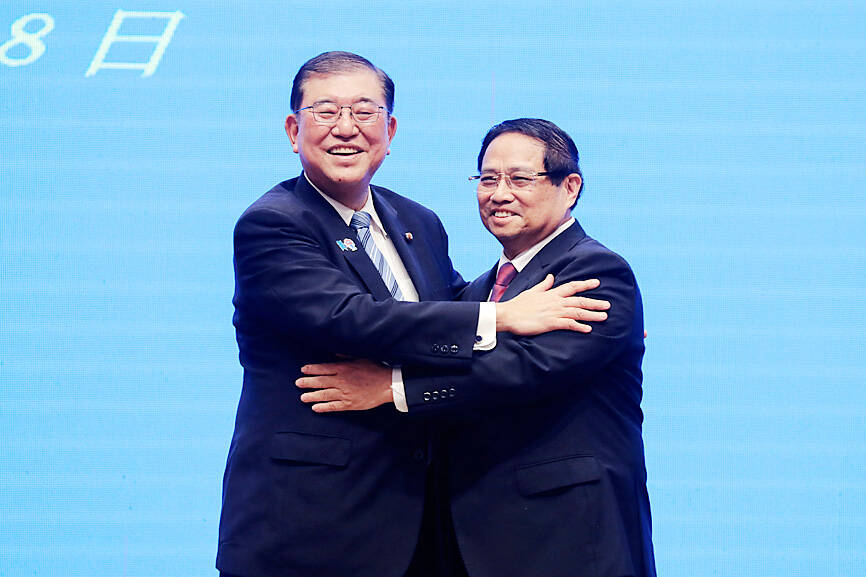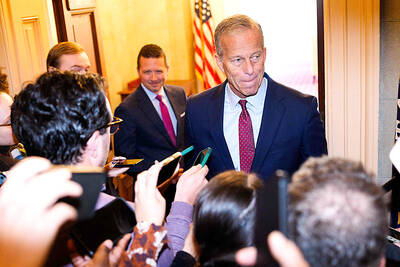Japan and Vietnam yesterday agreed to boost bilateral trade and uphold global rules on the free flow of goods as Japanese Prime Minister Shigeru Ishiba met Vietnamese leaders in Hanoi while both nations engage in talks with Washington to avoid tariffs.
Ishiba’s first trip to Vietnam, and his subsequent visit to the Philippines today, mark the latest high-level East Asian meetings amid escalating global uncertainty triggered by the threat of crippling US tariffs.
“The world economy is becoming more uncertain and the impact on the Southeast Asian region is also becoming apparent,” Ishiba told reporters yesterday after a meeting with Vietnamese Prime Minister Pham Minh Chinh.

Photo: EPA-EFE
Vietnam this month has hosted Chinese President Xi Jinping (習近平) and top South Korean ministers, while Tokyo has held a trilateral meeting with China and South Korea.
The White House earlier this month slapped “bilateral tariffs” of 46 percent on Vietnam and 24 percent on Japan. Those duties were later paused until July as bilateral talks are underway, but a 10 percent levy applies on all imports into the US, which is a major market for both nations.
“We will cooperate to maintain a free and open international order based on the rule of law,” Ishiba said in a joint news conference with Chinh where journalists’ questions were not allowed.
Vietnam is a major assembling hub for Japanese manufacturers, including Honda, Canon and Panasonic, with a total of US$78 billion invested in the Southeast Asian nation by Japanese firms, Vietnamese Ministry of Finance data shows.
Japanese banks also hold strategic stakes in top Vietnamese lenders.
“The two countries agreed to uphold the global order of free trade based on international rules,” Chinh said, after the two leaders signed four cooperation agreements, including on boosting trade in energy transition products, and on research and development on semiconductors.
The contents of the agreements were not disclosed.
Vietnamese Communist Party General Secretary To Lam urged Japan to increase its investment in infrastructure projects after he met Ishiba on Sunday, a Vietnamese government’s portal reported.
Japan has been involved in preliminary studies for the construction of a high-speed railway connecting Hanoi to the southern business hub of Ho Chi Minh City, which with an estimated cost of US$67 billion is Vietnam’s most ambitious infrastructure project.
The leaders did not explicitly mention railways among fields of cooperation. Vietnam has said it plans to finance the project largely on its own.

James Watson — the Nobel laureate co-credited with the pivotal discovery of DNA’s double-helix structure, but whose career was later tainted by his repeated racist remarks — has died, his former lab said on Friday. He was 97. The eminent biologist died on Thursday in hospice care on Long Island in New York, announced the Cold Spring Harbor Laboratory, where he was based for much of his career. Watson became among the 20th century’s most storied scientists for his 1953 breakthrough discovery of the double helix with researcher partner Francis Crick. Along with Crick and Maurice Wilkins, he shared the

China’s Shenzhou-20 crewed spacecraft has delayed its return mission to Earth after the vessel was possibly hit by tiny bits of space debris, the country’s human spaceflight agency said yesterday, an unusual situation that could disrupt the operation of the country’s space station Tiangong. An impact analysis and risk assessment are underway, the China Manned Space Agency (CMSA) said in a statement, without providing a new schedule for the return mission, which was originally set to land in northern China yesterday. The delay highlights the danger to space travel posed by increasing amounts of debris, such as discarded launch vehicles or vessel

IMPASSE: US President Donald Trump pressed to end the filibuster in a sign that he is unlikely to compromise despite Democrat offers for a delayed healthcare vote The US government shutdown stretched into its 40th day yesterday even as senators stayed in Washington for a grueling weekend session hoping to find an end to the funding fight that has disrupted flights nationwide, threatened food assistance for millions of Americans and left federal workers without pay. The US Senate has so far shown few signs of progress over a weekend that could be crucial for the shutdown fight. Republican leaders are hoping to hold votes on a new package of bills that would reopen the government into January while also approving full-year funding for several parts of government, but

TOWERING FIGURE: To Republicans she was emblematic of the excesses of the liberal elite, but lawmakers admired her ability to corral her caucus through difficult votes Nancy Pelosi, a towering figure in US politics, a leading foe of US President Donald Trump and the first woman to serve as US House of Representatives speaker, on Thursday announced that she would step down at the next election. Admired as a master strategist with a no-nonsense leadership style that delivered for her party, the 85-year-old Democrat shepherded historic legislation through the US Congress as she navigated a bitter partisan divide. In later years, she was a fierce adversary of Trump, twice leading his impeachment and stunning Washington in 2020 when she ripped up a copy of his speech to the